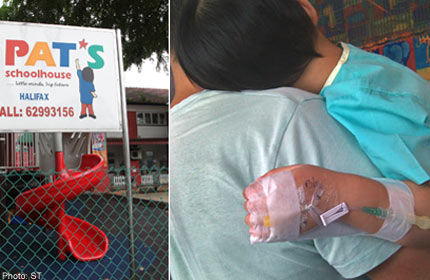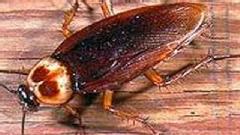Wellesley, Ontario, home of the annual Wellsley Apple Butter and Cheese Festival , the last Saturday every September, is a nice enough place. Now populated largely by commuters who want the tech jobs in Waterloo, Ontario, but the small-town lifestyle, the place keeps on.
But those commuting parents may want to check out what is being served to their kids at the local school.
As reported by The Elmira Independent, a local paper with lotsa investigative journalism credibility, 28 children ordered hamburgers on March 3, 2011, as part of .jpg) Wellesley public school’s regular hot lunch program.
Wellesley public school’s regular hot lunch program.
The hamburgers arrived at the school, wrapped in tin foil, from Wellesley restaurant and catering business The Grill and Chill Drive In; a number of students complained about finding “pinkish red,” undercooked hamburger in their meals.
Color is a lousy indicator of food safety, but when public health types visited the The Grill and Chill Drive In, they found failure to maintain records of manufactured meat to aid in identification, and failing to ensure food was cooked to a minimum internal temperature.
No thermometers.
Once informed of the potentially raw hamburgers, Wellesley principal Lee Anne Andriessen immediately called Region of Waterloo Public Health. She was told to collect all of the remaining hamburgers so they could run a full screen of the meat for any pathogens.
“Her concern was for the safety of the children involved,” said Brenda Miller.
The region’s manager of infection control, rabies, and vector borne diseases, said it was the principal’s good diligence that sparked the investigation and allowed health inspectors to begin work the same day.
Public health officials made calls to parents of all 28 children who had ordered meals to warn them about possible symptoms their children may experience if the undercooked meat was ingested.
Miller said 20 different samples were tested and no pathogenic organisms were .jpg) isolated.
isolated.
Miller said public health officials will continue to work with the school board to provide food safety awareness.
All schools that offer hot lunch programs through outside catering companies are advised to make sure the food coming into schools is produced at regularly-inspected premises.
In the weeks following the incident, the school has continued to use hot lunches supplied by the restaurant under investigation by public health, although the menu was different and hasn’t included any hamburger.
If parents want the service for their kids, fine, but ask questions grounded in food safety: like using a thermometer to make sure food is properly cooked, handwashing compliance, sourcing food from safe sources. An annual inspection from the local health types is not enough.

 chain’s 14 centres, reported the Straits Times.
chain’s 14 centres, reported the Straits Times..jpg) vomiting and stomach aches and then another fifteen minutes they were just coming in students were coming in we had a total of 102 students who were registered with the vomiting.”
vomiting and stomach aches and then another fifteen minutes they were just coming in students were coming in we had a total of 102 students who were registered with the vomiting.”  Carrie Zapka from GOJO Industries in Akron Ohio, the lead researcher on the study that also included scientists from BioScience Laboratories in Bozeman, Montana and the University of Arizona, Tucson.
Carrie Zapka from GOJO Industries in Akron Ohio, the lead researcher on the study that also included scientists from BioScience Laboratories in Bozeman, Montana and the University of Arizona, Tucson. the kitchen, the cafeteria or both, but a few schools had bugs in a storage room or bathrooms near the cafeteria.
the kitchen, the cafeteria or both, but a few schools had bugs in a storage room or bathrooms near the cafeteria..jpg) Wellesley public school’s regular hot lunch program.
Wellesley public school’s regular hot lunch program..jpg) isolated.
isolated.(11).jpg) be closed until Sunday. The sickness tally rose to 1,048 on Tuesday.
be closed until Sunday. The sickness tally rose to 1,048 on Tuesday..jpg) previous day which was cooked in the school kitchens for some 3,100 students.
previous day which was cooked in the school kitchens for some 3,100 students.